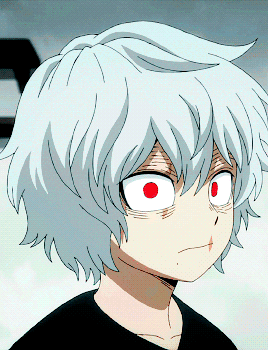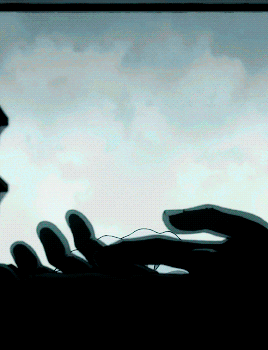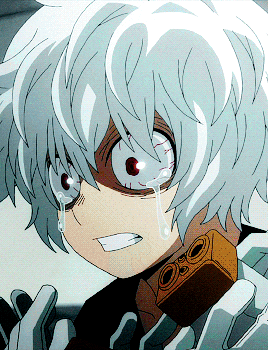Text

1 note
·
View note
Text
I have a theory about how Shigaraki's story will end in MHA.
There is one moment that seemed prophetic to me. The moment from the opening of Season 6, where Shigaraki becomes Tenko again, falls at Izuku's feet, and Izuku extends his hand to him.


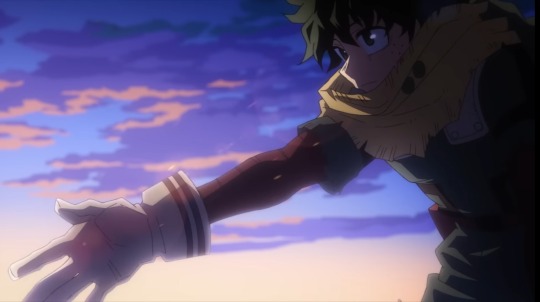
That is, I think that perhaps Shigaraki will be saved by becoming a child again. It might sound crazy...BUT! Do you remember Eri? So far she hasn't played a major role in the plot other than giving Mirio his quirk back. She is constantly in the background.


I think her quirk Rewind can return Shigaraki to the state before he was injured, namely when he was only 5 years old.
I see that Eri is definitely a Chekhov's gun that definitely needs to go off. Otherwise, why would the Horikoshi hang this gun on the wall?
#my hero academia#boku no hero academia#shigaraki tomura#tenko shimura#eri bnha#bnha#mha#mha theory#bnha theory
119 notes
·
View notes
Photo
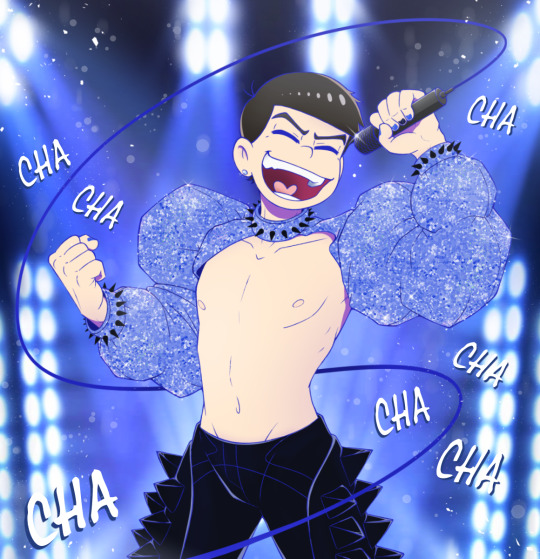
Was joking with a friend that Kara would probably wear a sequin version of Käärijä’s bolero and the image wouldn’t leave my head.
477 notes
·
View notes
Text
Osomatsu and Big Brother Syndrome (analysis of character)
Perhaps this is the Matsu who is most afraid of growing up, who wants his carefree life with his brothers to never change. In a sense, HE is one of the reasons why NEET boys are still stuck at the bottom of the social hole, because he is the leader followed by his brothers, and it is his position that influences the rest.
Why exactly the brothers became NEET is a multi-faceted topic for analysis that combines several social and psychological factors, and I will focus on Osomatsu in my essay. Here I will touch on the topic of how the role of an older brother affected him.
To complete the research, of course I should watch Osomatsu-kun, but I will go from what I know.
So, the main problem lies in the model of raising sixteens chosen by the parents. They are all the same age, the difference in the order of their birth is several minutes, from birth they are equal to each other. It was an extremely strange decision to attach importance to their seniority and build their upbringing on this, so a clear hierarchy inevitably formed between them, with Osomatsu at the head.
Many of those who have younger brothers and sisters are familiar with what it's like to suddenly have a responsibility that you didn't want or ask for (I'm one of them too). In the case of Osomatsu, this seems doubly unfair, because they are gearheads, where the division into seniors and juniors is simply ridiculous.
Childhood is that bright time of our life, where we have no worries, there is nothing to worry about, because there are adults who take care of you and solve your problems. The child does not have this burden of adult life and they can enjoy their time without unnecessary worries.
For parents, the eldest child becomes a kind of substitute for their parents, their little “adult” assistant, he has not yet learned to be responsible for himself, but he should already be responsible for someone else, and no one asks his opinion “you are now the eldest ". As a result, we get a person endowed with the responsibility of an adult, but deprived of the privileges inherent in adults; they are still subject to childhood restrictions.
In the case of Osomatsu, he is the eldest by default at the start. He was deprived of the privileges of a child, the right to be carefree and free from the burden of responsibility.
Throughout the series, he asked a reasonable question: “why the hell am I the eldest, we are sextuplets, we are all the same age!” and it’s hard to disagree with this.
He also repeatedly stated his desire to be an only child, because he lived in constant competition with his brothers; if he were the only one, there would be no competition.
Due to early independence and lack of attention to him as a child from his parents, he had problems with self-determination, and as a result, difficulties in finding his place in life.
On the one hand, he takes on the role of an elder, and on the other hand, he wants to escape from this, tightly clinging to his right to remain a child, which they tried to take away from him. As a result, he was mired in lifelong stagnation.
#osomatsu san headcanons#mr osomatsu#osomatsu san#osomatsu matsuno#osomatsu san analysis#mr. osomatsu#ososan#Osomatsu
59 notes
·
View notes
Text
Karamatsu is not narcissus (analisis of character part 2)
Assuming that Karamatsu's behavior is not entirely a game, then we can assume that he really does have a personality disorder, namely...
Histrionic personality disorder.
This is where the interesting part comes in and why Karamatsu is considered a narcissist when in truth he is not.
The fact is that HRD has similar features to NRD, but has a number of significant differences. The term “narcissist” is much better known than “hysteric”, hence the confusion.
As in the case of NPD, a person’s main need is to always be the center of attention, the personality is also self-centered, however, for a hysteric, receiving attention from others is an end in itself. The narcissist, on the contrary, attracts attention to himself in order to demonstrate his superiority.
The next obvious difference is the absence of problems with empathy. Narcissists can show it, but only externally; internally they are not capable of compassion.
So, who are the hysterics? These are very extravagant, bright personalities who strive to attract attention to themselves in every available way. Moreover, attention can be different from love and admiration to anger and disgust; they will be happy with anything as long as they are noticed. When they are not noticed or ignored it causes discomfort.
Features of behavior. In speech and behavior they are similar to theater actors, they are prone to vivid displays of emotions, their speech is dramatic and, as a rule, figurative, impressionistic, grandiose, but at the same time not specific and contentless. The intonation of the voice is also dramatic, the voice can be comically cartoonish, childish or seductive.
His outrageous behavior most of the time irritates Ichimatsu in particular, while the others try to ignore him. In fact, Ichi reacts more than others to his ridiculous phrases and antics, despite the fact that he expresses this through anger and irritation, but this is still the attention that Karamatsu desperately needs.
Also, the main way to stand out from the crowd is appearance. They choose bright, extravagant, revealing outfits that often border on absurdity. Let's remember his T-shirts with his own face, shiny pants and boots, short shorts and cowboy hats, sunglasses that he wears even at night.
For narcissists, being ridiculous, funny and stupid in the eyes of others is humiliating and like death.
Causes of HRD. Lack or complete absence of attention in childhood and adolescence.
Karamatsu is from a large family in which he could not get enough love and attention from his parents, in high school he was a lonely, quiet child whom no one noticed, he had no friends, which also left a mark on his mind and brought him to creating your dramatic self.
If we briefly compare these two personality types, narcissists are vain, arrogant people who consider themselves to be among the elite, hysterics are clowns who are not ashamed of being clowns.
I'm more inclined to think that he's just pretending. With my analysis I wanted to prove that even pretending Karamatsu does not behave like a real narcissist.
#osomatsu san headcanons#mr osomatsu#karamatsu matsuno#karamatsu#analisis#osomatsu san analysis#osomatsu san#ososan#mr. osomatsu
39 notes
·
View notes
Text
Karamatsu not narcissus (analyse of character part 1)
[Dear reader, you are reading the translation of my original text into English, I hope I didn't mess up the translation too much😅]
Karamatsu is always given this short description. This constantly raised doubts in my mind; in my opinion, although he has some narcissistic traits in his behavior, he is far from a real narcissist.
I decided to look into this issue and did a little psychoanalysis of the character.
Narcissism in psychology is part of the dark triad, which implies negative character traits characterized by malicious intent and a detrimental (sometimes destructive and dangerous) influence on others.
First, let's figure out what narcissism is. I will consider this term at two extremes: as a character trait and as a mental disorder.
Trait. A narcissist is a person with high self-esteem, inclined to exaggerate his talents and achievements, self-centered (aimed at satisfying only his own needs, without focusing on the feelings of other people). As a rule, they tend to manipulate other people to achieve their goals and satisfy their own needs. Empathy is either weak or absent. Cold and sometimes cruel cynics.
Narcissistic personality disorder.
An extreme and painful manifestation of narcissism that develops into a mental illness.
People with NPD consider themselves special, exaggerate their abilities and achievements, exalt themselves in front of other people by belittling and devaluing others. It is important for them to be an object of admiration. They are very sensitive to criticism, since their high self-esteem is very fragile, they are extremely dependent on the opinions of others. They react to a negative assessment aggressively and with contempt, or with condescension and withdrawal into complete denial. Incapable of love and empathy. Narcissists have a vague self-image and invent an ideal persona that everyone should love. For a narcissist, being less than perfect in the eyes of others is unbearable and painful.
From my experience of communicating with such people, I can say that narcissists are cunning bastards, their true nature is difficult to recognize right away. They know how to put you at ease, lull your guard, they flatter you, praise you, show interest, not forgetting to mention how lucky you are to meet such an amazing person like them. And you unconsciously begin to believe them. Then devaluation, manipulation, emotional swings and gaslighting come into play. If you don't notice the trick in time, the narcissist will destroy you.
Their grandiosity is mostly a lie in which they themselves sincerely believe and this reaches the point of delusions of grandeur. With delusions of grandeur, it is simply impossible to convince a narcissist of one’s own imperfection.
So, narcissistic personality disorder is characterized by:
• A persistent pattern of behavior with a sense of self-importance, a need for admiration and a lack of empathy.
This pattern appears when the following signs are present:
• Exaggerated, unreasonable sense of self-worth and talents (yes)
• Preoccupation with fantasies of unlimited achievement, influence, power, intelligence, beauty, or ideal love (yes)
• Belief in your own specialness and uniqueness (yes)
• Need for unconditional admiration (yes)
• Exploitation of others to achieve one's own goals (no)
• Feeling of the right to special treatment (possibly partially)
• Lack of empathy (none)
• Envy of others and the belief that others are jealous of them (possibly partially)
• Arrogance (no)
So, many points coincide and we can say with confidence that Karamatsu is really a narcissist, but I will give you arguments to refute this statement.
1. He never manipulated or belittled or devalued other people. He cannot be called arrogant and cynical.
2. One of the fundamental traits of a narcissist is weak or absent empathy. Karamatsu has demonstrated more than once that he is capable of compassion. In 1s in the "flower fairy" ep, he feels pity for Chibita and for the blind girl in 2s 18ep, stands up for Jushi in 1s 24 ep, in 3s 5 ep he was ready to give up on the girl from the pharmacy, seeing Totti's progress in communicating with her, feels sorry for Totoko in 3s when she is depressed about her failed idol career. The narcissist can feign compassion, but in the examples listed there were cases where no one saw him and there was no point in pretending.
3. Despite praising himself (even alone with himself 3s 25ep) he is well aware of his position as a NEET and a virgin, and accepts the fact that he is at the bottom of the social ladder. He acts demonstrably self-confident only around family and friends, but when confronted with other people who are higher in status than him (that is, he recognizes that ordinary people are higher in status than him) (1s sp, 2s beach episode, first film) his self-confidence evaporates. A true narcissist never admits that he is inferior to others.
His unhealthy self-esteem and belief in his own exclusivity are just a mask and self-hypnosis, which already calls into question his status as a narcissist. In addition, there is one important point that is worth mentioning, namely the prerequisites for becoming a narcissist.
Narcissists are people with deep psychological trauma rooted in childhood and adolescence when the child’s psyche is very malleable.
Children of 3 types of parents become narcissists: absentees, when parents do not care at all about their child; parents are sadists, who can also be narcissists (heredity and adoption of the parent’s behavior model also play a role here), upbringing is accompanied by mental and/or physical violence; overprotective parents who plant in the child’s mind the idea that he is the best and unique. Karamatsu does not have these prerequisites.
Thus, I can confidently state that Karamatsu's narcissism is only an image, a fictional personality created as the opposite of what he was like during his school days.
But I won't dwell on this. Assuming that Karamatsu's behavior is not entirely a game, then we can assume that he really does have a personality disorder, namely... continue in part 2
#osomatsu san headcanons#osomatsu san#mr. osomatsu#karamatsu matsuno#mr osomatsu#karamatsu#analisis#Osomatsu san analysis#ososan
37 notes
·
View notes
